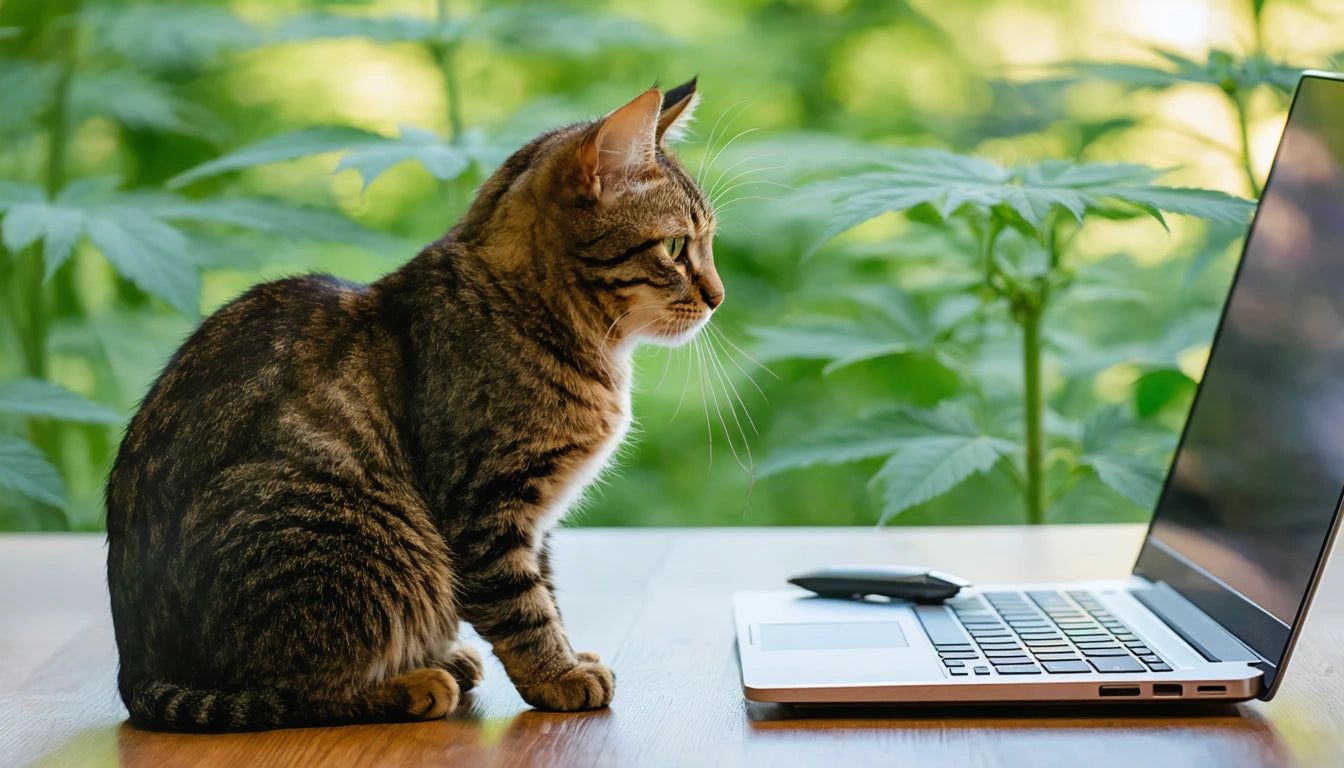Table of Contents
How Marijuana Affects Cats: Safety, Risks, and Considerations
Cannabis consumption has become increasingly common as legalization spreads across many regions. With this rise in popularity comes an important question for pet owners: how does marijuana affect cats? Whether you're wondering if cats can get high from secondhand smoke or concerned about accidental ingestion, understanding the relationship between cannabis and felines is crucial for responsible pet ownership.
Marijuana and Cats: Understanding the Basics
Cats have an endocannabinoid system similar to humans, but with important differences that make them much more sensitive to THC, the psychoactive component in cannabis. Unlike humans who might enjoy recreational effects, cats don't experience marijuana in a pleasant way. Their smaller bodies and different metabolism mean that even small amounts of cannabis can cause significant adverse reactions.
Many cat owners wonder, "can cats smell weed?" The answer is yes. Cats have highly sensitive olfactory systems and can detect the distinct aroma of cannabis. However, this doesn't mean they're attracted to it. Most cats are actually averse to strong smells, including marijuana smoke.
How Cannabis Affects Feline Physiology
When asking "does weed affect cats," it's important to understand the physiological impact. THC binds to cannabinoid receptors in a cat's brain and body, affecting multiple systems:
- Neurological effects: disorientation, impaired coordination, and altered consciousness
- Cardiovascular effects: changes in heart rate and blood pressure
- Gastrointestinal effects: nausea, vomiting, and decreased appetite
- Respiratory effects: breathing difficulties when smoke is inhaled
Understanding the effects of THC on cats reveals that what might be a mild experience for humans can be overwhelming and potentially dangerous for felines. Their bodies simply aren't equipped to process cannabinoids the same way humans do.
Secondhand Smoke Exposure Risks
A common question among cannabis users is "can I smoke weed around my cat?" While brief, occasional exposure to secondhand cannabis smoke may not cause severe symptoms, regular exposure can lead to health issues. Cats can indeed get high from secondhand smoke, though the effects may be less intense than direct ingestion.
Smoke of any kind can irritate a cat's sensitive respiratory system. Cats with pre-existing conditions like asthma or bronchitis are particularly vulnerable. If you must consume cannabis in a home with cats, consider using proper ventilation systems or switching to smoke-free alternatives like pre-rolled cones that produce less ambient smoke when used outdoors.
Accidental Ingestion: Symptoms and Dangers
The question "what happens if a cat eats weed" is unfortunately becoming more common as cannabis products become more accessible. Accidental ingestion poses a significant risk to cats, with symptoms including:
- Severe lethargy and depression
- Dilated pupils and glassy eyes
- Vomiting and diarrhea
- Loss of balance and coordination
- Drooling and hypersalivation
- Slow heart rate or rapid heart rate
- Urinary incontinence
- In severe cases, seizures or coma
Edibles pose a particular danger as they often contain high concentrations of THC along with other ingredients like chocolate or xylitol that are toxic to cats. The answer to "can cats eat weed" is a definitive no. Cannabis in any form should be kept securely away from curious felines.
Emergency Response for Cannabis-Exposed Cats
If you suspect your cat has been exposed to marijuana, either through ingestion or significant smoke exposure, immediate action is necessary:
- Contact your veterinarian or an emergency animal hospital immediately
- Be honest about the potential exposure to ensure proper treatment
- Do not induce vomiting unless directed by a veterinarian
- Monitor vital signs and keep your cat comfortable during transport
- Bring the suspected cannabis product to help determine the dosage
Veterinarians are primarily concerned with your pet's health, not your legal status. Understanding cannabis exposure in cats allows for faster, more effective treatment. Most cases of marijuana toxicity in cats are treatable with proper veterinary care, though recovery time varies based on exposure level.
Responsible Cannabis Use Around Pets
For those who use cannabis and have feline companions, responsible practices are essential:
- Store all cannabis products in secure, pet-proof containers
- Consume in well-ventilated areas away from pets
- Clean up any residue or ash immediately
- Consider pet-free spaces for consumption
- Be aware of symptoms of accidental exposure
The question isn't just "can cats be around weed" but rather how to ensure their safety when cannabis is present. With thoughtful precautions, pet owners can minimize risks while respecting their cats' sensitivity to these substances.
While humans may choose to consume cannabis for recreational or medicinal purposes, our feline companions should never be exposed to its effects. Their unique physiology makes them particularly vulnerable to adverse reactions, and what we might consider a mild substance can be genuinely dangerous for them. By understanding these risks and taking appropriate precautions, responsible pet owners can ensure their cats remain safe and healthy in households where cannabis is present.











Leave a comment
All comments are moderated before being published.
This site is protected by hCaptcha and the hCaptcha Privacy Policy and Terms of Service apply.